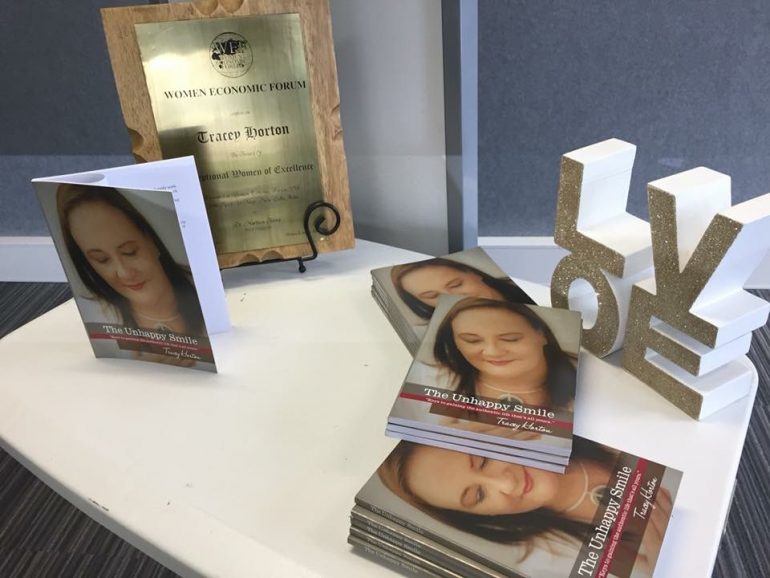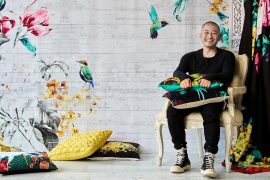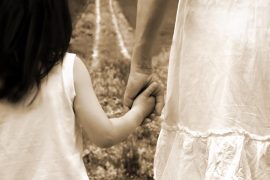Tracey Horton, author of The Unhappy Smile, Gold Coast grandmother and international award winner speaks to Get it’s Kathleen Loxton about her powerful journey from hopelessness to hope

Before all her success, Tracey had been through a 20-year journey from brokenness to becoming whole after years of abuse and putting on an unhappy smile. Tracey was born into a family full of domestic and sexual violence, her father was a schizophrenic with five personalities and her mum was so beaten down that she was emotionally and mentally absent.
When Tracey was 12, she lost her home in a fire started by her father; now precious few photos remain of those early years. Though Tracey put on a brave face, it masked what was going on behind closed doors. Her father began abusing her mother (quickly followed by a domestic abuse warrant placed on him by the police), and things went from bad to worse while she was trapped in an environment of alcoholism, violence and abuse.
This understandably took its toll on Tracey as a young adult, and tragically there was little place she could turn to for help at the time. Tracey explained, “By the time I was 14, I had been sexually abused by 12 different men and no one cared. At 18 I was told by a psychiatrist that I would be unable to contribute to society and should be medicated.”
By the time I was 14, I had been sexually abused by 12 different men and no one cared.
Tracey recalled of that moment, “Something snapped that day as I imagined myself the sad, lonely drunk girl in the local pub, looking 60 at 30 and I gave myself five years or I would quietly just take my life – in that five years I found the keys I have put in my book and I am now happily married 32 years, having raised four incredible daughters. I am living proof you should never write someone off, while there is breath there is hope.”
It was Tracey’s life experience that led her to write The Unhappy Smile, where she bravely shares her personal account that previously had only been shared with her closest of friends. However, there is no self-pity there, and her compassion for others and the strength of her resolve shines through. It’s Tracey’s courageousness and her support of those experiencing such abuse, that is the driving force behind her work.
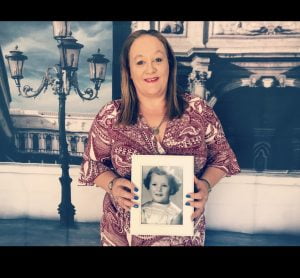 Tracey spoke of the very night it all came about, saying,“I remember clearly the night I knew this book had to be written. Dinner was as usual – my four daughters plus extras, lots of food (that’s the Polynesian way), laughs and love – and one of my daughter’s friends helped with dishes afterward and opened up about her life in a home full of domestic and sexual violence, she was so sad and confused, it was like meeting myself. That night I cried myself to sleep and I knew I owed it to her and many others to show them – the story isn’t the important part, it’s who you become through it that counts.”
Tracey spoke of the very night it all came about, saying,“I remember clearly the night I knew this book had to be written. Dinner was as usual – my four daughters plus extras, lots of food (that’s the Polynesian way), laughs and love – and one of my daughter’s friends helped with dishes afterward and opened up about her life in a home full of domestic and sexual violence, she was so sad and confused, it was like meeting myself. That night I cried myself to sleep and I knew I owed it to her and many others to show them – the story isn’t the important part, it’s who you become through it that counts.”
It’s clear that this message and Tracey’s journey has connected not only with those around her, but people on a global scale. At the end of last year,Tracey attended The Women Economic Forum in New Delhi, India, the largest global gathering of female entrepreneurs and leaders worldwide, where she won the prestigious Exceptional Woman of Excellence Award. Tracey described the event as, “…a strong heart-filled event that champions the belief that women are a very important part of this world and have a responsibility to contribute and make a change. To be given the award was the single most powerful moment for me. I was on stage telling my story, looking out on a sea of Indian women who I knew shared much of my hurt, to see them clap and honour me, many thanking me afterwards, was such an emotional, life-changing moment.”
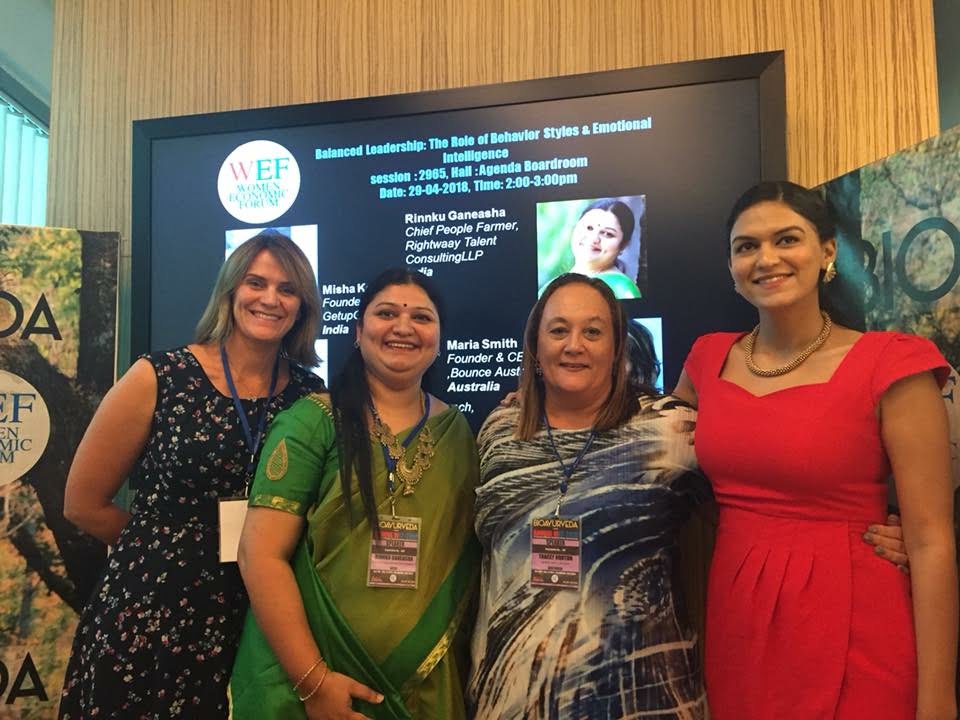
What does Tracey want us to take away from this? “Firstly, that it is time to talk, address and change our tolerance toward domestic and sexual violence worldwide, it’s enough now. Secondly, that there is hope, if you don’t get killed through the domestic or sexual violence, then there is a healing and a way out.”
That night I cried myself to sleep and I knew I owed it to her and many others to show them – the story isn’t the important part, it’s who you become through it that counts.
According to the Government’s report Family, domestic and sexual violence in Australia, 2018, here in Australia,
“One in four women and one in six men have experienced emotional abuse by a current or previous partner. Furthermore, one in six women and one in 16 men have experienced physical and/or sexual violence by a current or previous partner”. Lastly, “One woman a week and one man a month were killed by a current or former partner in the two years from 2012–13 to 2013–14.”
The ABC added to these findings, reporting in November 2018, “Research clearly shows the behaviour of victims has little bearing on the likelihood of domestic violence in intimate relationships. Domestic violence can happen to anyone, regardless of age, race or socioeconomic status.”
A key message in helping to change these numbers, is speaking out against such abuse. It was once said by Tracey, “Everyone has days where they can’t smile, but we live in a culture where we’re meant to smile every day. Sometimes, in people’s lives they mask that. That’s why I chose that title, because for a lot of my life it was a big mask. Now I live my life authentically, and when I smile, I mean it.”
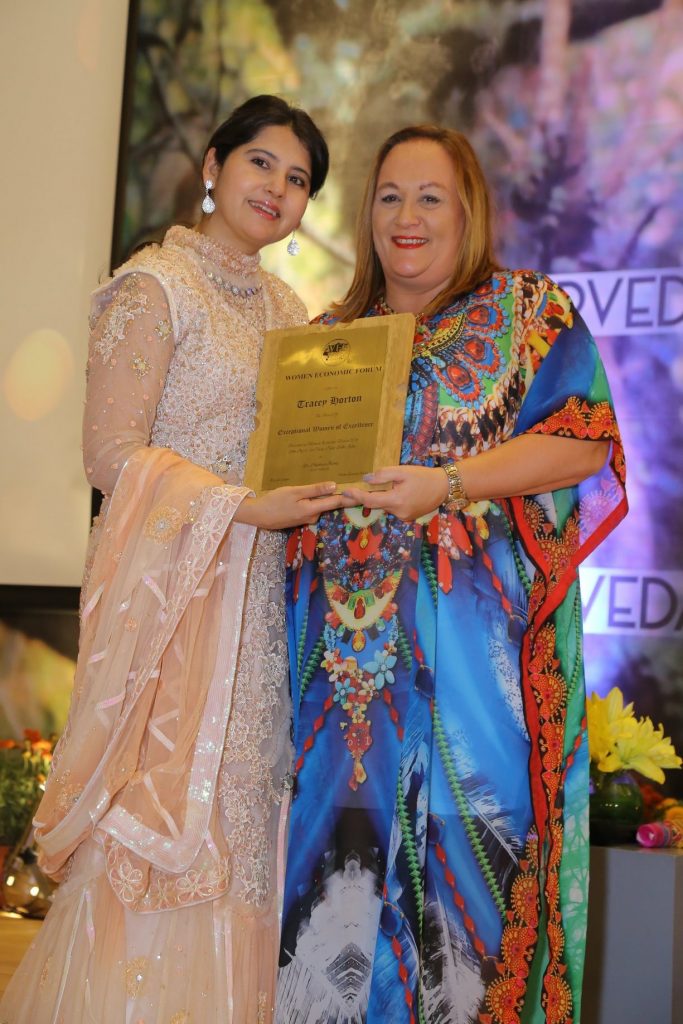 Tracey will continue spreading her important message and carrying on her vital work, whilst upholding her integral approach to this topic. Currently, Tracey is self-published despite offers, and for every copy of The Unhappy Smile purchased, she donates two copies to shelters and those in need, who have suffered sexual, physical and emotional abuse. What’s more, this is the first book of three to be released. She described, “Once I settled that I was going to write it, I then worked out what I wanted it to be — honest but not dishonouring, raw but full of hope and an instruction on how to heal and not let the story be you.”
Tracey will continue spreading her important message and carrying on her vital work, whilst upholding her integral approach to this topic. Currently, Tracey is self-published despite offers, and for every copy of The Unhappy Smile purchased, she donates two copies to shelters and those in need, who have suffered sexual, physical and emotional abuse. What’s more, this is the first book of three to be released. She described, “Once I settled that I was going to write it, I then worked out what I wanted it to be — honest but not dishonouring, raw but full of hope and an instruction on how to heal and not let the story be you.”
While Tracey would love to be in contact with her parents, sadly that’s not the case today. It’s important for Tracey to focus on the good, and let old wounds heal while dealing with her history. Her connection to her partner, four children and eight grandchildren is a powerful bond that keeps her strong, and what has happened in the past doesn’t define the direction they are heading. The way Tracey leads her life is a shining example of courage that motivates all around her.
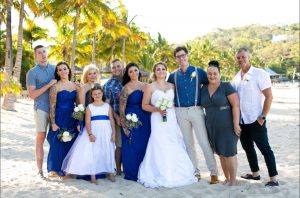
This incredible woman left us with an inspiring and poignant remaining thought, “I hope they know their worth, that no man or woman has the right to hurt or harm another. I hope they look at me and say, ‘If she did, I can’. My advice, never protect the one hurting you – no one gains from false protection like that and never forfeit your hope to become more than the story, to heal, to pick up the pen (figuratively) and write your own ending, because you truly can be free.”
For more information, and to purchase Tracey’s book, visit traceyhorton.com

